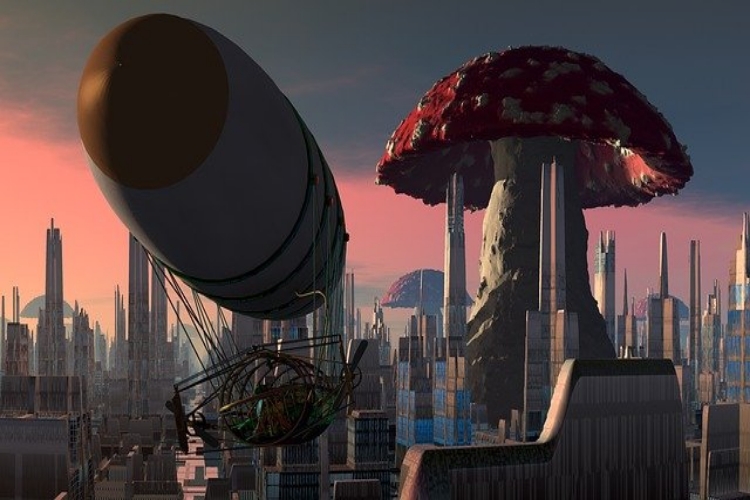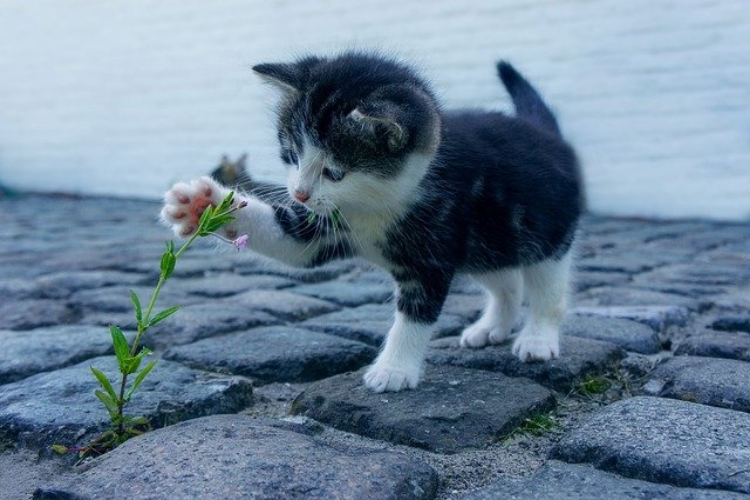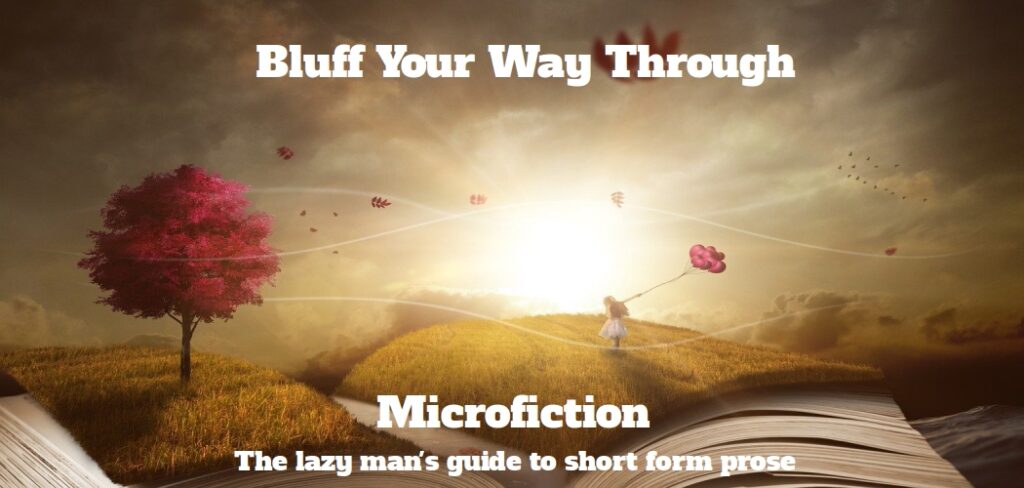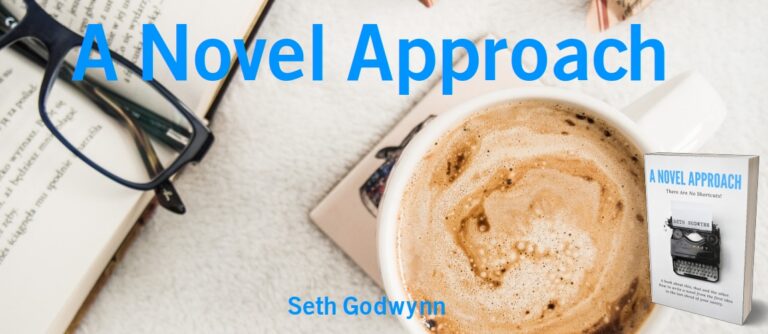Bluff Your Way Through Micro Fiction
The lazy man’s guide to short form prose
A steaming dollop of Seth and a zesty dash of Jack
A popular genre of ultra-short story for writers that enjoy prose but hate poems, not to mention readers with short attention spans, is micro fiction. A story could be as short as a single sentence, or anything up to five or six paragraphs. Ideally not more than a page though. Two pages tops. Or more.
Two details that make micro fiction stand out as a distinct genre of fiction, and not merely a lack of time and effort on the part of the author, are as follows:
1. It must convey the tone of being an entirely self-contained story: everything the reader needs to know should be contained within the text.
2. It must appear greater than the sum of its parts: a small piece of work that hints at being part of a much bigger picture
If the two appear to contradict each other, it’s because they do. To put it a slightly different way then, which in hindsight, I probably should have just done from the outset, micro fiction should exist in its own universe, and not be part of another story. Micro Fiction should also invite questions that fire up the reader’s imagination in fun and colourful ways.
A popular example of flash fiction, a subset of micro fiction, and often attributed to Ernest Hemmingway is as follows:
For sale: baby shoes, never worn.
It hints at the wider story by raising questions it leaves to the reader to answer. Why were the shoes never worn? Did the baby have an identical pair, part of a two for the price of one offer? Were they dress shoes that the baby never had occasion to wear before growing out of? Or perhaps the person who placed the advert was merely a merchant trading in such items. You may find other possible answers that shock and sadden you, but whichever you decide on, there is a wider context implied that exists only in the reader’s imagination.
Another good example is actually a quote from the popular British TV comedy, Blackadder:
Thank God, we lived through it! The Great War—1914, to 1917.
On the show, we already understood the context of course, but as a standalone quote it serves the purpose well. We know it’s about World War I, and the relief of having survived would imply that death was a real possibility, so the speaker is probably a front line soldier. He’s under the impression that the war is over, but as we all know in hindsight, it doesn’t end for another year. Perhaps he survives the next year, but if he did, then his quote would simply be a mistake and not worthy of writing about. I think it’s safe to assume that he was premature in his appraisal, and dies before the war ends, which adds a certain pathos to the delivery.
A popular style of micro fiction is character study. A quick introduction to a particular character’s quirks can imply an overall picture of the kind of person he or she is.
One of the advantages of this style of writing is that unlike structured long form fiction, very little forethought is needed. You really can just start with nothing, write whatever comes to mind, and then mould it into something meaningful afterwards.
So with that said, I will share some quick-start pointers to formulating your own micro fiction based on my many years of experience in the field. Please note that this is just one approach to a single kind of micro fiction, and as you edit your work you may see better directions to take the story that are not included here, or even directly contradict it. The aim really is to give you a skeletal structure that hints at what form the finished product may take to act as a springboard for your own creativity, rather than an infinitely unhelpful blank sheet. Do with it what you may!
Begin with a mundane statement
It can be more or less anything. Just string a bunch of words together if necessary. Use a random first line generator if you like. The most important thing is that it 1) provides absolutely no context, and 2) invites questions. Some examples:
Nigel never was one for hotdogs.
Who is Nigel? Why are we talking about hotdogs? What is his beef with them? These are all the questions that have already begun to populate the reader’s mind. One of them will be interesting enough for you to flesh out. The rest should go unanswered.
So there we were, stuck on the moon.
Who are ‘we?’ Why were we on the moon in the first place? How did we get stuck? What are we going to do now? With this many questions, it practically writes itself.
With micro fiction, most of the creative work is in the editing. If the piece you eventually pen doesn’t quite match the opening line, you can go back and change it later. Change it as many times as you like, in fact!
And when writing, you would do well to always…

Write in the first person
Part of the charm of the genre is that it feels intimate to the reader, so they need to be able to think of the narrator as one of the characters. Writing in first person means that every unquoted word is still a character quote, which allows you to economise on exposition, present opinion as fact, and all manner of other shortcuts you wouldn’t be able to get away with in the third person.
If we were to talk about Nigel’s distaste for sausages in buns, we could make a broad statement that, Nigel is a man of strong preference, and is rarely known to compromise. While it may be presented as a fact, it isn’t; it’s merely an interpretation on the part of the unnamed narrator as to how Nigel might best be understood.
If we were to talk about the conundrum our moon-bound chums are facing, we could make a broad statement that, by and large, second hand lunar modules are rarely a good investment. As a statement of fact, I feel certain many engineers might disagree and with good reason, but as a statement of opinion, it might help to explain their conundrum in the first place.
But while we may present our narrator’s own opinions as fact…

Do not reveal what characters are thinking
Let the characters reveal their own nature to the reader, by describing what they do, and quoting what they say. This helps cut down on exposition, and makes for a more concise story.
You could spend paragraphs describing in great detail what Nigel does and does not like about hot dogs, and what perhaps he might prefer instead, but it would be much more fun for Nigel to tell us himself.
“Hrmph. Waste of a perfectly good sausage!”
What does this tell us about him? First, the grumble suggests he might be a bit grumpy. Second, that he actually likes sausages, just not in hot dog form. What is it about the form he dislikes though? Does he not like bread? Is it the ketchup and mustard? Does he prefer a good sausage be free of external flavourings? Is he militant about flavour mixing in general? Does he feel that a sausage is best enjoyed on a plate with a knife and fork? Some of these questions you may like to expand on, and others leave open. It all depends on what sort of a person you want to make him. Remember, you don’t have to get it right the first time, and in fact should expect not to. Write down what you think will work, and then come back and review it after.
Our cheapskate space farers on the other hand, you could spend paragraphs describing how they ended up skimping on one of the more important details of their voyage, or we could just let one of the characters (who we’ll call ‘Sack’ for now…) tell us in his own words.
“Honest Baz promised it was solid! One careful owner, he said!”
What does this suggest to us? Rather obviously, their predicament was Sack’s fault for buying a used lunar module from a dealer named ‘Honest Baz.’ Is this the sort of thing that Sack does often? Is there a characteristic in there that needs a spotlight shone on it?
The best way to expand on it is to…

Flesh it out with anecdotes
As we’re in the business of describing what characters do and say, rather than what they think, you should not be afraid to use anecdotes to highlight other instances of the personality trait in focus.
Nigel seems to be the sort of person that expects things to be a certain way, and gets grumpy when they’re not. So how about introducing some other examples. You could limit it to table manners, to the consumption of food, or make it a more general trait. It’s entirely up to you, and you can always change them later. Perhaps near his house is a roundabout with traffic lights, which he takes great issue with every single time he is forced to stop. Perhaps he uses the same words every time, so let him tell us those words. Perhaps he takes issue with sales staff calling him by his first name—tell us about an instance!
Sack on the other hand seems the sort that can’t be trusted to make good life and death decisions, yet our down-on-his-luck co-traveller never learns his lesson. When has this sort of thing happened before? Perhaps Sack volunteered to cater for an event the narrator was hosting, and felt that a couple of packs of supermarket brand crispy pancakes and a bag of chips would suffice. Perhaps they decided to put together a publishing business and write books together, and Sack thought it was a good idea.
The possibilities are endless, but whenever possible…

Use specifics over generalities
It’s not enough that Nigel doesn’t like traffic lights on roundabouts. Which roundabout is it? If it’s the M25 Swanley Interchange, then say so. Likewise, it’s not enough to tell us that a shop sales staff referred to him by his first name: What was the shop? What was he buying? If he was at Currys in Bromley purchasing a new mouse mat after his nephew spilled coffee on his old one, from a blue and red uniformed teenager wearing a badge that says, ‘Hi, I’m Angus,’ then say so. The more specific the better.
That function that Sack catered for: what was the function in aid of? Who was attending? If it was the 50th anniversary of the Royal Society of Space Hopper Enthusiasts that our narrator was hosting, with special guest attendees, The Chuckle Brothers, then this is something your reader needs to know! What was the name of their publishing business? What books did they specialise in? Romance? Sparkling vampires? What are the names of some books they may (or may not) be known for? Let your imagination run wild, but be specific.
You will be glad you did later, when you come to…

Then, make them mean something
By now, you should be discovering some themes in your work, and it’s a good idea to go back and tie the specifics of the examples to these themes. This part can be a little harder, as it requires you to make connections between distant parts of the story, and in some cases, change the specifics to fit.
If we assume, perhaps, that Nigel simply does not like ketchup and mustard on his sausages, perhaps an underlying issue is with the colours red and yellow. This would tie in with his issue with traffic lights on roundabouts, as part of a broader dislike of traffic lights in general. The teenager that speaks to him informally is currently wearing a blue and red uniform, so let’s change that to a yellow and red uniform to make it consistent. While we’re at it, let’s change the substance spilled on his mouse mat from coffee to strawberry jam and banana. The odds of your readers spotting this connection are very slim, but if they do, they will think themselves very clever, and assume that the work is a lot deeper than first imagined.
Our second example begins with our protagonists on the moon, and it’s established that the narrator is a collector of space hoppers (an idea I just came up with by looking around the room which is currently strewn with childrens’ toys—remind me to reference this earlier). The books they’re writing are currently romance and sparkling vampires, so perhaps it would make far more sense to go with science fiction and space fantasy.
Keep it specific, then make it mean something, and the more specifics you use, the more meaningful connections you can make. But whatever you do…

Keep it concise
The goal is to tell the biggest story you can with the fewest words. Make every word count, and once you’ve made your point, move straight on to the next. Do not linger, do not repeat yourself, and do not say anything that can just as well be inferred or imagined.
One technique for keeping it short is to use words that don’t describe, but resonate. We don’t need to explain that ‘Honest Baz’ is a dodgy dealer, because it’s implied by the context, and that impression is loaded into the name. Would you buy a used lunar module from somebody named Honest Baz? Likewise, we don’t have to explain why supermarket brand crispy pancakes are an inappropriate dinner choice for any occasion really, because the image is already sufficiently loaded with resonance and horse to paint a perfect image for us.
Another way to reduce words is to trim down the specifics you put all that effort into putting in. Some of our specifics provide description through resonance and others make thematic connections to other parts of the story. Any remaining specifics can probably be written out of the story now.
And when you finally reach the end…

Tie is back to the beginning
The very last line should in some way connect to the first, and if possible, continue the themes you’ve established. If necessary, go back and change the first line so it all fits.
Nigel’s distaste for hot dogs is established right off the bat, as is his apparent disdain for the colours red and yellow further down the page. Perhaps at the end, he’s hungry and the only choices are McDonalds and a hot dog stand. McDonalds being coated in red and yellow from ceiling to floor would perhaps be more distasteful to him than mustard and ketchup, so it could finish with him saying, “I want a hot dog.”
In our other example, we’ve established straight off that they are stuck on the moon, and that they both have an interest in space, but we also assume their priority is to get back to the safety of earth. Perhaps to subvert this expectation, it would make more sense to finish with Sack saying something to the effect of, “We’re never going to get to Mars at this rate!”

And there you have it, your first piece of micro fiction. Just remember that your first draft is nothing but raw material. Most of the hard work is going to be performed in the editing, but it will all pay off in the end. Laziness can be hard work!
Many thanks for reading this article. We hope it was interesting, informative and entertaining. Follow us on social media or share our content on your own pages. It helps us grow so we can create more free content to help you.

